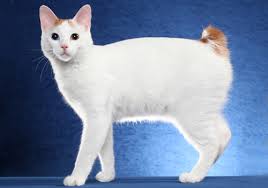
Japanese Bobtail
Conditions of detention
Japanese Bobtails are adaptable and thrive in a variety of living environments, from apartments to larger homes. They enjoy a stimulating environment with access to interactive toys and climbing structures, as they are active and playful cats.
Useful Fact:
Japanese Bobtails are known for their love of water and may enjoy playing in a shallow basin or splashing around in a safe, controlled environment.
Nutrition and diet
Japanese Bobtails require a balanced diet consisting of high-quality cat food rich in proteins, fats, vitamins, and minerals to support their active lifestyle and muscular build. Fresh water should always be available, and portion control is important to prevent obesity.
Useful Fact: Japanese Bobtails can benefit from a diet that includes both dry and wet food to ensure they receive adequate hydration and support dental health.
Health
Japanese Bobtails are generally healthy with no specific breed-related health issues. Regular veterinary check-ups, vaccinations, and preventative care are essential. Monitoring for common feline issues such as dental disease and obesity is important.
Useful Fact: The natural genetic diversity of Japanese Bobtails contributes to their robust health and lower incidence of hereditary diseases.
Grooming and care
Japanese Bobtails have moderate grooming needs. Short-haired varieties require weekly brushing, while long-haired ones may need more frequent brushing to prevent matting. Regular nail trimming, ear cleaning, and dental care should also be part of their grooming routine.
Useful Fact: Japanese Bobtails enjoy grooming sessions, which can strengthen the bond between the cat and its owner.
Education and training
Japanese Bobtails are intelligent and can be trained using positive reinforcement techniques. They can learn tricks, use a litter box efficiently, and follow basic commands with consistency and patience.
Useful Fact: Japanese Bobtails are quick learners and often enjoy interactive training sessions that challenge their minds and keep them engaged.
Toys and entertainment
Interactive toys, puzzle feeders, and climbing structures are ideal for keeping Japanese Bobtails entertained. Providing a variety of toys helps to stimulate their active minds and prevent boredom.
Useful Fact: Japanese Bobtails are particularly fond of toys that mimic the movements of prey, such as feather wands and laser pointers.
Safety
Indoor living is recommended for Japanese Bobtails to protect them from outdoor hazards such as traffic, predators, and diseases. Ensure windows and balconies are secure to prevent accidents.
Useful Fact: Japanese Bobtails are curious and agile, so providing a safe and stimulating indoor environment with plenty of opportunities for exploration is essential.
Accessories
Essential accessories for a Japanese Bobtail include a sturdy scratching post, comfortable bedding, litter boxes, and grooming tools. Interactive toys and climbing trees are also beneficial for their physical and mental stimulation.
Useful Fact: Providing vertical spaces like cat trees or shelves can help satisfy the Japanese Bobtail’s natural climbing instincts and provide them with a sense of security.
Socialization
Japanese Bobtails are naturally sociable and thrive on interaction with their human families and other pets. Early socialization helps them develop into well-adjusted adults who are comfortable in various environments.
Useful Fact: Japanese Bobtails often form strong bonds with their owners and other pets, making them excellent companions in multi-pet households.
Travel and Transportation
Japanese Bobtails can adapt to travel if introduced gradually. Using a secure carrier and providing familiar items like a blanket or toy can help reduce travel-related stress.
Useful Fact: Some Japanese Bobtails may enjoy exploring new environments and can be trained to walk on a leash, making them good travel companions.
Behavior and psychology
Japanese Bobtails are affectionate, playful, and inquisitive cats. They are known for their loyalty and strong bonds with their owners, often displaying dog-like behavior in their interactions.
Useful Fact: Japanese Bobtails can be vocal and expressive, using a variety of sounds to communicate their needs and feelings to their owners.
Legal aspects
Before acquiring a Japanese Bobtail, check local regulations regarding pet ownership, including licensing and microchipping requirements. Adherence to responsible breeding practices and animal welfare laws is also important.
Useful Fact: Japanese Bobtails are recognized by several major cat registries, including The International Cat Association (TICA) and the Cat Fanciers’ Association (CFA), ensuring adherence to breed standards and responsible breeding practices.


